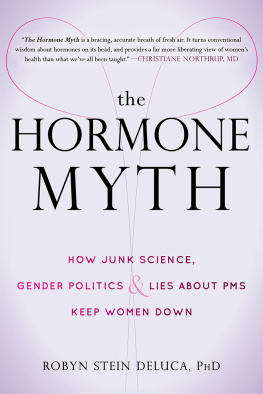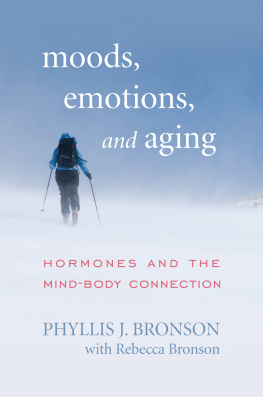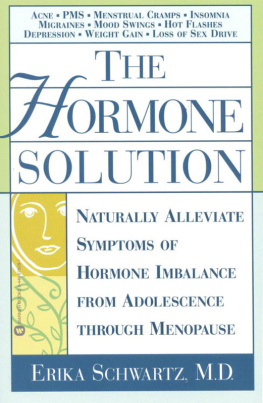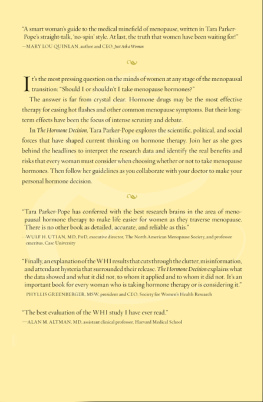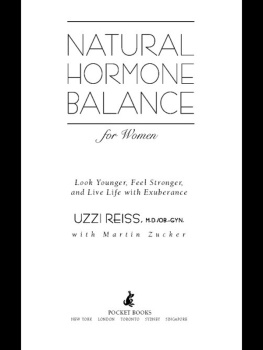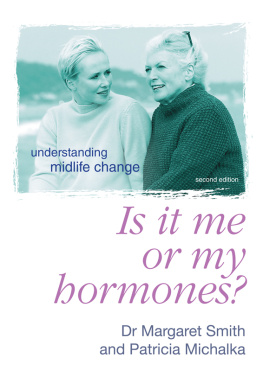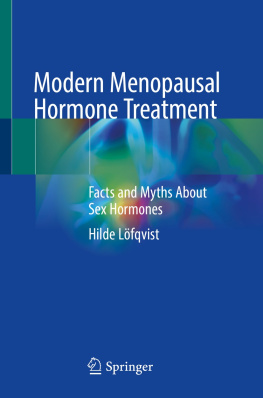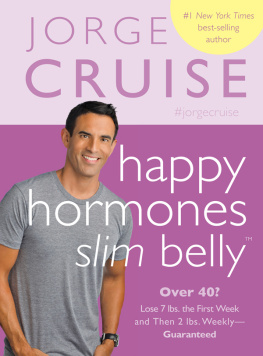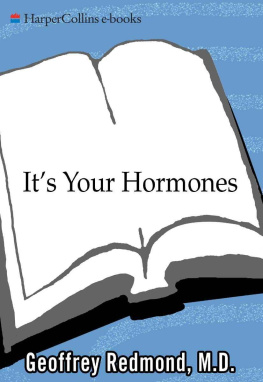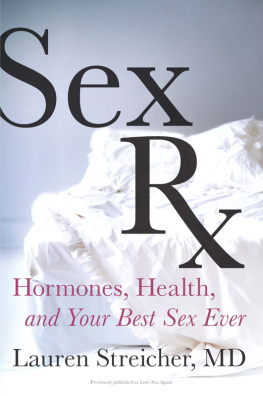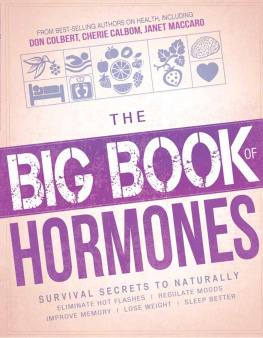
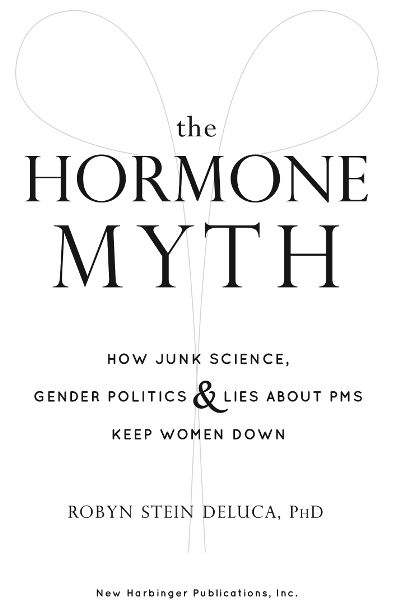
TheHormoneMyth is a bracing, accurate breath of fresh air. It turns conventional wisdom about hormones on its head, and provides a far more liberating view of womens health than what weve all been taught.
ChristianeNorthrup, MD, OB/GYN physician and author of the NewYorkTimes bestsellers GoddessesNeverAge; Womens Bodies, Womens Wisdom; and TheWisdomofMenopause
This is a book for every woman who has ever been asked Are you on the rag? after she voices an unpopular opinion or expresses an unfeminine emotion. Read it, share it with your friends, and join the movement to bust the hormone myth once and for all.
JoanC. Chrisler, PhD, editor of Womens Reproductive Health
This eye-opening book covers female developmental milestones (e.g., menarche, pregnancy, menopause) where the hormone myth is characterized by an excessive focus on biology over modifiable environmental factors, while ignoring empirical findings in favor of pseudoscience, sensationalism, scaremongering, and the fragilization of women. One chapter at a time, from Aristotle to Trump, the author weaves together historical, cultural, and economic developments thatintentionally or notcreate and maintain this hormone myth. The author argues cogently that the eventual impact on women is a net negative: despite a few short-term social gains, these myths keep women feeling, and being perceived, as overly emotional and less suitable for competent leadership. This is a must-read for any person who wants to know what science can truly tell us about the relationship of hormones to womens mental health, and how to help debunk entrenched societal myths that perpetuate gender inequities at home and work.
Jacqueline Pistorello, PhD, research faculty at Counseling Services at University of Nevada, Reno, and coauthor of FindingLifeBeyondTrauma
TheHormoneMyth not only helps women recognize the cultural forces boxing them in, but provides the tools needed to be smart consumers of some of the scientific research that falsely insinuates they are hormonal maniacs. DeLuca brings a fresh and engaging voice to the stubborn myth of womens emotional instability.
SusanPincus, MD, family physician
Publishers Note
This publication is designed to provide accurate and authoritative information in regard to the subject matter covered. It is sold with the understanding that the publisher is not engaged in rendering psychological, financial, legal, or other professional services. If expert assistance or counseling is needed, the services of a competent professional should be sought.
Distributed in Canada by Raincoast Books
Copyright 2017 by Robyn Stein DeLuca
New Harbinger Publications, Inc.
5674 Shattuck Avenue
Oakland, CA 94609
www.newharbinger.com
Cover design by Amy Shoup
Edited by Jennifer Holder
Indexed by James Minkin
All Rights Reserved
Library of Congress Cataloging-in-Publication Data
Names: DeLuca, Robyn Stein, author.
Title: The hormone myth : how junk science, gender politics, and lies about PMS keep women down / Robyn Stein DeLuca.
Description: Oakland, CA : New Harbinger Publications, 2017. | Includes bibliographical references.
Identifiers: LCCN 2016050783 (print) | LCCN 2017020425 (ebook) | ISBN 9781626255104 (PDF e-book) | ISBN 9781626255111 (ePub) | ISBN 9781626255098 (pbk)
Subjects: LCSH: Women--Psychology. | Women--Mental health. | Hormones. | BISAC: HEALTH & FITNESS / Womens Health. | SOCIAL SCIENCE / Womens Studies. | MEDICAL / Gynecology & Obstetrics. | SELF-HELP / Personal Growth / General.
Classification: LCC HQ1206 (ebook) | LCC HQ1206 .D3627 2017 (print) | DDC 155.3/33--dc23
LC record available at https://lccn.loc.gov/2016050783
For my daughters, Caroline and Jamie
Contents
Notes 189
Index 221
The Myth That Traps Us
Womens hormones make them crazy. Everyone knows this. The ups and downs of our monthly hormone cycle turn women into moody, irrational, angry, unpleasant, PMSing witches. Pregnancy makes us incapable and incoherent. After childbirth, dangerous changes in hormones can cause postpartum depression so severe we can harm ourselves or our babies. And then as menopause approaches, comes, and goes, we get despondent, depressed, and crazy as loons. Therefore, women are to be feared, kept under wraps, and put in their place not just by men but by humanity as a whole.
Weve all heard PMS jokes, coddled a pregnant woman, followed horrifying accounts of postpartum murder in the news, and seen a sitcom character come unhinged because she is of that age. Im sure you and many women you know have had your anger explained away because its your time of the month, had sadness you felt in the weeks after childbirth chalked up to just hormones, or found your new aspirations in life dismissed because you are just being menopausal and not yourself.
Everyone agrees that changing hormones make women nuts; its a fact of life we all unfortunately have to live with. Right?
Wrong. Hormones dont make women crazy.
How can that be? How can something so taken for granted actually be wildly overstated? This persistent and willful ignorance of the truth is what makes the hormone myth so dangerous. Women individually and as a whole, all men who care about us, families, marriages, businesses, communities, politicsthe very structures of our societiesare harmed by believing it.
Because what everyone knows is actually inaccurate. A large body of scientific research says that fluctuating reproductive hormones dont play a major role in womens mental health, because when womens emotional stability is measured by the frequency and severity of mood swings they experience over time, it is in fact similar to the stability of men.
Surprised? Well, heres the kicker: psychologists have known that since the early 1990s but it is probably news to you. This shows the power of the hormone myths spell over us and speaks volumes about all the profiting, political-maneuvering, salary- and career-repressing, and relationship-appeasing motives that compel us to keep believing in and perpetuating something thats just not true for every woman.
Yes, some women suffer disturbing physical symptoms because of hormone change. There are women who have terrible cramps during their periods and perimenopausal women can have twenty hot flashes a daytheir complaints are definitely real and may need medical attention. And there are some women who do experience distressing emotional symptoms associated with hormone change that require treatment. But they are a minority. The hormone myth says that all women become emotionally erratic when their hormones fluctuate and that is simply not true. Mistakenly attributing any negative emotion women have to hormones comes with many costs, and I wrote this book because I believe we will all be better off once we stop blaming womens feelings on their hormones.
I use the term myth to describe a belief that is based on faulty information or reasoning, but has been accepted by society and serves, in some way, to maintain the status quo. The power of these myths is wide-reaching, long-lasting, and seemingly intractable. The hormone myth is built on the foundation of the ancient but persistent idea that women are inferior to men because of a biological-based emotionality and on evidence from poorly done scientific studies conducted in the mid-twentieth century. The myth has been perpetuated through all types of media, whether on television, at news outlets, in books and magazines, or throughout the Internet. And as youll see, many parties benefit financially and socially from the maintenance of the hormone mytheven as it causes womens health, professional advancement, and personal relationships to suffer.
Next page
